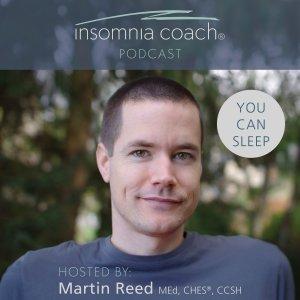Insomnia Coach® Podcast

How Bill's health scare led to insomnia and how tackling sleep-related thoughts and behaviors helped him improve his sleep (#14)
Listen to the podcast episode (audio only) Bill is a 57-year-old self-employed mechanical design engineer who lives in Australia with his wife and three children. In August 2018, Bill was admitted to hospital with a suspected heart attack and this triggered an intense period of insomnia that led to progressively worse sleep. Bill soon found himself following a long list of pre-sleep rituals that did not improve his sleep but did lead to more sleep-related worry. Fortunately, Bill was told about cognitive behavioral therapy for insomnia (CBT-I) and was able to get his sleep back on track. In this episode, Bill tells us how his insomnia developed, all the ways he tried unsuccessfully to improve his sleep, and he shares the specific techniques that he found to be most helpful for improving his sleep. Click here for a full transcript of this episode.Click here to hide the transcript. Martin Reed: Welcome to the Insomnia Coach Podcast. My name is Martin Reed. I believe that nobody needs to live with chronic insomnia and that evidence-based cognitive and behavioral techniques can help you enjoy better sleep for the rest of your life. Martin Reed: The content of this podcast is provided for informational and educational purposes only. It is not medical advice and is not intended to diagnose, treat, cure, or prevent any disease, disorder, or medical condition. It should never replace any advice given to you by your physician or any other licensed healthcare provider. Insomnia Coach LLC offers coaching services only and does not provide therapy, counseling, medical advice, or medical treatment. The statements and opinions expressed by guests are their own and are not necessarily endorsed by Insomnia Coach LLC. All content is provided "as is" and without warranties, either express or implied. Martin Reed: Okay. So thank you so much for taking the time to be on with us today, Bill. Bill Hunter: My pleasure. Martin Reed: So let's start at the beginning. When did your sleep problems begin, and do you remember what initially triggered that sleep disruption? Bill Hunter: Yes. So sleep problems really started in about February of this year, and it's been a part of... Well, to be honest, I think in August last year I was admitted to hospital with what was a suspected heart attack. Didn't turn out to be that, but it was an anxiety-related issue. So I guess in using a term that used to be used, it was probably what you might describe as a nervous breakdown in August last year. So it's been a very difficult last 12 or 14 months or so for me. Bill Hunter: It was one of those ones where, I guess in terms of mental health, they call it the holy trinity, I think. Anxiety, depression, insomnia, they all go together. So the insomnia part of it started as I said in February while I was away from home for a few days, in a night where I got zero sleep, which I don't think had ever happened to me that I can ever remember before. So after that, those nights of no sleep seemed to be happening just more and more frequently, and it just became very, very distressing really. Bill Hunter: You end up just in this, I think, this sort of vicious circle where the insomnia feeds the anxiety, and the depression becomes a bit worse and you sort of just spiral down, so that's when it started. Martin Reed: Yeah, absolutely. I think everyone listening to this will really identify with you talking about this vicious cycle, you know where you start to worry about sleep, sleep becomes more difficult, and then it kind of leads to even more worry about sleep, which then makes sleep more difficult.






 Visit Podcast Website
Visit Podcast Website RSS Podcast Feed
RSS Podcast Feed Subscribe
Subscribe
 Add to MyCast
Add to MyCast